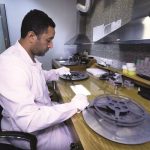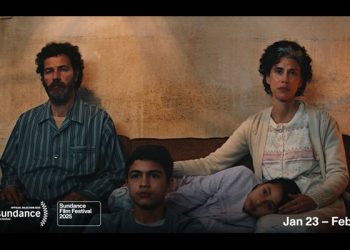With films cheaper to make than the average fees a film school charges, regional film schools, both private and government, are staying relevant with curricula geared to a disruption-ridden broadcast industry.

There is a whos who list of directors who never went to film school, and in the digital age the argument for attending a three-year course to learn filmmaking has never been on more tenuous footing. Digital tools for shooting, editing and even distributing movies have become so accessible that film schools are facing as much disruption in the digital age as the rest of the broadcast industry.
Alive to the challenge that it has never been cheaper to make a movie, Middlesex has put together a curriculum that it believes equips students for 21st-century challenges. And it begins with the faculty, explains Afroz Nawaf, Film Lecturer, Media & Film Studies Department at Middlesex University Dubai. BroadcastPro met with Nawaf; Dr David Tully, Senior Lecturer in Media and Film Studies, Middlesex University Dubai; and their colleague Daniela Tully.
There is a reason why we are called MDX studios, explains Nawaf. We take classic classroom experiences and turn them into a practice with real-world project integration, and partnerships with strategic and corporate partners.
Located in Dubais Knowledge Park, the universitys MDX Studios features industry-standard editing suites with colour grading suites, editing and VFX suites, an ADR booth, 4K editing facilities and a newly-designed integrated learning space that also includes a screening room.
Nawaf says MDX Studios is currently the only film university in the Middle East to be certified by Blackmagic Design, explaining: Blackmagic Design has a programme called Train the Trainer, which consists of a group of hand-picked trainers from all around the globe. I flew to London to be trained by them in various post-production disciplines. Here, we do our edit, sound, visual effects and final project completion through Resolve 15 so I am certified to certify my students or anyone in the industry with a Blackmagic end-user certification. By the end of the second year, we cover the entire Resolve 15 book, and on completion, along with the degree, they also receive their certifications from Blackmagic Design.
Indicating David Tully, Daniela Tully and himself, he adds: All three of us are actively working in the industry. I have a digital agency. Industry outreach is a core feature of our curriculum.
An active scriptwriter himself, Dr David Tully elaborates: We actively seek teaching staff with one foot in academia and one foot in the industry. Virtual reality is currently being taught by Hassan Kiyany, an Emirati filmmaker and entrepreneur himself. He also teaches a course in the third year on entrepreneurship, helping students put their professional portfolio together, among other skills.
Our visit coincided with the news that well-known author Stephen King had awarded budding filmmakers at Middlesex University Dubai the rights to adapt the short story Stationary Bike from his book Just After Sunset, for just $1. The story of an ordinary household object assuming otherworldly powers with a terrifying twist, the project will entail the participation of students across academic years one, two and three, with the final DVD of the short film being shared with Stephen King along with a possible private screening at Roxy Cinema.
Anyone wanting to participate in the making of the film will have to pitch for it, stresses Daniela Tully, also an author and industry veteran who has worked on projects such as Contagion and The Best Exotic Marigold Hotel. Movies start with the verbal pitch, and the Middlesex faculty has made it a pivotal feature of the curriculum. From the elevator pitch to the expanded pitch, Daniela guides second-year students on the art of pitching: I often play the role of the studio executive. Pitching helps them resolve the gaps in their stories, among other flaws.
She covers the history of filmmaking, while the course also covers all matters technical and Dr David Tully helps students develop and fine-tune their scripts.
The guiding philosophy at Middlesex, in terms of staying relevant to the modern-day student, is clear a film education that readies the student for the industry. While the concept of a total filmmaker is still cherished, every film student is not positioned to be a director, explains Tully. I have a student who has now discovered that he is proficient at producing a movie. We have had students who start as writers and find themselves skilled at directing.
The three-year bachelors programme for filmmaking may not be everyones cup of tea. While There Will be Blood director Paul Thomas Anderson famously dropped out of film school two days into the course, he is a protégé of the famed Sundance Feature Film Programme, which supports independent filmmakers from development through distribution of their feature projects.
Abu Dhabis Image Nation has created a somewhat similar year-long mentorship programme with Arab Film Studio. The seven-year-old Arab Film Studio, in the words of Image Nation CEO Michael Garin, aims to train the regions next generation of filmmakers to get behind the camera and tell their stories.
Speaking about the initiative to BroadcastPro ME at the recently concluded Arab Film Studio Awards 2018, Gehad Darwish, Head of Marketing and Communications at Image Nation Abu Dhabi, said: The programme is growing and becoming a key training platform for filmmakers who work in different sectors but who did not have the opportunity to express themselves. We have seen more than 120 students graduate. We have been accepted in more than 260 film festivals, and so far we have had 20 wins.
Documentary programme participant Mariam Al Awadhi won the Best Film Documentary award for Mum, in which a girl voices her emotions regarding her non-Emirati mother. Describing the training she received, she says: I had basic knowledge of filmmaking and Arab Film Studio helped me a lot to grow my experience coming up with ideas for my film, how to research it and produce it. At the event, scriptwriting programme participant Salma Sherry won a $27,224 (AED 100,000) production grant to make her script a reality.
Students leave the Arab Film Studio with peers who have a shared film passion and language.
Employability is possibly the most frequent topic when new students and their parents approach the likes of Middlesex. To ensure that the classroom remains grounded in the real world, Nawaf and his colleagues have forged a partnership between MDX and regional distributor Shooting Stars Middle East to produce local content for Warner Bros. and Universal Brand Development, offering students real-life creative challenges to produce content that will engage audiences.
Nawaf outlines the projects completed. Our students have put together promotions for Jurassic World, Fantastic Beasts: The Crimes of Grindelwald and the Universal Studio summit, among others.
The deal also exposes the students to brands such as Vox Cinemas, Dubai Parks & Resorts and Ski Dubai. Most importantly, they learn to create content for the myriad platforms at their disposal, besides traditional film and linear TV.
Touting 120% year-on-year growth, Nawaf says: We started with three students in 2014. We are selective of the students coming into the department, and we are currently at 45-plus students.
Actively encouraged to enter film competitions, Middlesex students have won multiple awards at competitions such as the 48 Hour Film Project, and the film Hers Truly, written and directed by current student Sreelakshmi Sateesh, was one of the nominated films at the Global University Film Awards 2018 in Hong Kong.
In the midst of teaching them ground realities and getting them to engage with real-time clients, we ensure they remain true to the creative impulses that drew them to filmmaking in the first place, says Daniela Tully.
As an author herself, Tully is fascinated by the stories the region has to offer, and for her the value of regional film schools lies in the students they attract.
We have a pool of students who bring different cultures to the table and from us they learn how to tell their unique stories in a way that will travel, she observes.














































































